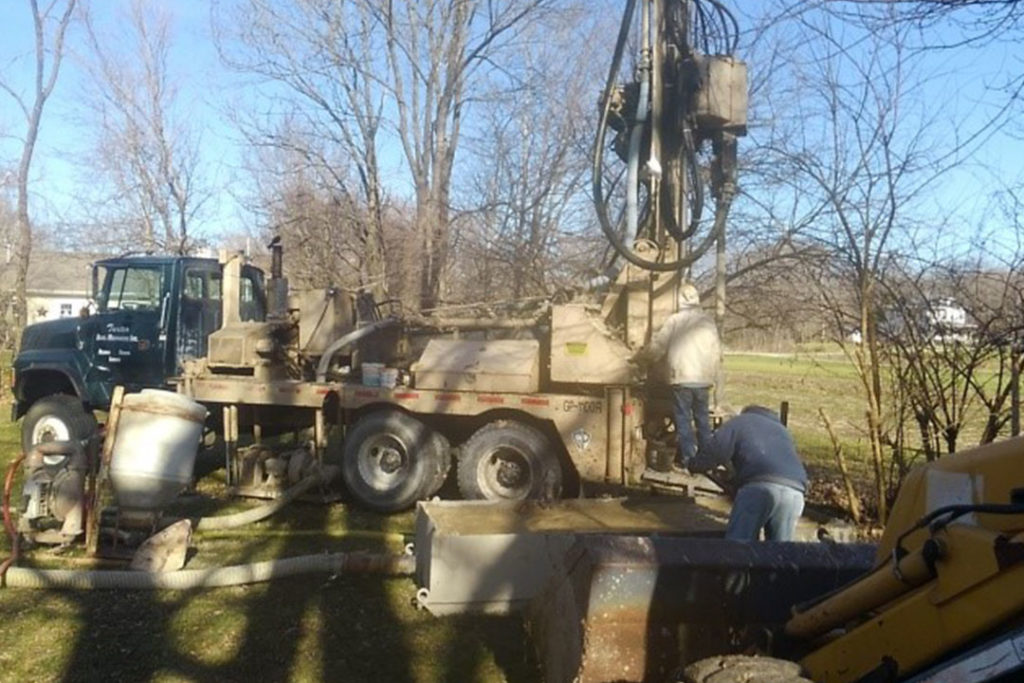The ultimate checklist for hiring a water well contractor Marshville NC
Improve Your Water Quality With Reliable Water Filtration Solutions for Well Drilling
Enhancing water quality is an important factor to consider for house owners counting on well water. Contaminants in groundwater can present considerable health dangers. Efficient water filtration options play an essential function in ensuring the security and taste of well water. Comprehending the kinds of filtration systems offered is crucial. This understanding can guide home owners in making informed decisions for their water requires. Nevertheless, selecting the right system requires mindful evaluation of particular pollutants. What alternatives are offered to improve your well water?
Understanding Groundwater Contamination
While numerous presume groundwater is inherently risk-free, different variables contribute to its contamination, positioning considerable threats to health and the environment. Agricultural techniques, including chemical and fertilizer use, can seep damaging chemicals into the soil, at some point getting to aquifers. Industrial activities may also launch contaminants, such as hefty metals and solvents, right into the ground, intensifying contamination concerns (water well contractor Marshville NC). Furthermore, improper waste disposal, consisting of septic systems and land fills, can present virus and hazardous substances into groundwater products
All-natural events, such as flooding or dry spell, can further affect water quality by modifying the balance of pollutants. As groundwater acts as a primary drinking water resource for millions, comprehending these contamination sources is vital. Neighborhoods must know neighborhood risks and supporter for tracking and protective measures to protect their water supply. Inevitably, acknowledging the complexities of groundwater contamination is vital to ensuring the health and security of both people and communities.
Significance of Water Filtration for Well Water

Impurity Elimination Advantages
Reliable water filtration is vital for guaranteeing the security and high quality of well water, as impurities can pose serious health dangers. Well water may consist of different toxins, consisting of microorganisms, hefty steels, and chemicals, which can detrimentally influence both wellness and preference. Making use of advanced filtration systems enables the effective removal of these hazardous substances, enhancing the overall water quality. The benefits of contaminant elimination consist of enhanced aesthetic high qualities, such as more clear and better-tasting water, as well as the reduction of possible wellness threats. In addition, reliable filtration systems can extend the life expectancy of plumbing and appliances by decreasing debris accumulation. To sum up, attending to pollutant removal through correct filtration strategies is necessary for preserving safe, tidy, and tasty well water.
Health And Wellness and Safety Guarantee
Making sure health and wellness in well water calls for a robust filtration system, as untreated water resources can harbor numerous pathogens and unsafe compounds. Contaminants such as microorganisms, viruses, heavy steels, and chemicals pose severe health and wellness risks to people depending on well water for drinking and family use. Reliable water filtration systems are essential for getting rid of these contaminations and ensuring the water is safe for intake. Normal screening and maintenance of filtration systems boost their effectiveness, thereby guarding public health. In addition, utilizing innovative technologies like reverse osmosis or UV therapy can further enhance water quality. To wrap up, buying reputable water filtration remedies not only secures individual health and wellness yet also promotes area well-being by promoting risk-free water accessibility.
Sorts Of Water Filtration Systems
A selection of water filtration systems are offered to ensure the high quality of well water. Reverse osmosis systems, carbon filtration methods, and UV water filtration stand for 3 usual strategies, each with distinct benefits and applications. Comprehending these alternatives can aid in selecting the most appropriate system for certain demands.
Reverse Osmosis Equipments
Numerous homes and industrial centers count on reverse osmosis systems as a key approach for water filtration. These systems function by pushing water through a semi-permeable membrane, efficiently eliminating pollutants, pollutants, and liquified solids. The process is especially valuable for removing numerous toxins, consisting of hefty steels, chlorine, and bacteria, leading to cleaner, much safer drinking water. Reverse osmosis systems can be set up at point-of-use locations, such as under kitchen sinks, or as whole-house systems, dealing with different demands. The performance of these systems makes them a preferred selection, supplying top notch water with very little maintenance. Customers must be conscious of potential water waste linked with the filtration procedure, which can vary depending on the specific system layout and usage.
Carbon Filtration Methods
Just how efficient are carbon filtration methods in boosting water top quality? Carbon filtration is a commonly recognized strategy that enhances water top quality by eliminating impurities and impurities. These techniques primarily make use of triggered carbon, which possesses a big area that adsorbs harmful compounds, including chlorine, unpredictable organic substances (VOCs), and certain hefty metals. There are numerous carbon filtration systems, such as granular activated carbon (GAC) filters and carbon obstruct filters, each offering distinct advantages depending on certain water quality concerns. GAC filters are generally made use of for taste and smell elimination, while carbon block filters offer better filtration. On the whole, carbon filtration techniques function as an effective option for individuals seeking to guarantee cleaner, much safer alcohol consumption water from well sources, attending to common issues related to water quality.
UV Water Purification
While several water filtration systems concentrate on physical and chemical removal of pollutants, UV water purification stands out for its ability to suspend microbes successfully. This technique utilizes ultraviolet light to disrupt the DNA of microorganisms, infections, and protozoa, making them unable to recreate and create condition. UV filtration is particularly helpful for well water, as it can address biological contaminants without adding chemicals to the water system. The system typically consists of a UV lamp housed in a protective chamber with which water streams. It is vital to keep in mind that while UV filtration effectively eliminates pathogens, it does not remove sediments, chemicals, or heavy metals; therefore, it is often used in conjunction with other filtration methods for comprehensive water treatment.
Benefits of Turned On Carbon Filters
Turned on carbon filters supply substantial benefits for water filtration, especially in well drilling applications. These filters efficiently eliminate contaminants such as chlorine, volatile natural substances (VOCs), and debris, improving the overall preference and odor of the water. By utilizing a process called adsorption, turned on carbon catches pollutants, guaranteeing cleaner water for various usages.
One more essential benefit is their capacity to minimize unsafe materials, such as hefty metals and chemicals, which might be present in well water. This makes activated carbon filters an essential part in securing public health and ecological high quality.
Additionally, the installment and upkeep of activated carbon filters are reasonably simple and cost-effective, giving a useful solution for water therapy. water well contractor Marshville NC. Their adaptability allows them to be incorporated into right here existing systems effortlessly, making them a popular option among house owners and professionals alike. Generally, activated carbon filters play an essential function in improving water high quality in well drilling contexts
The Function of Reverse Osmosis in Water Filtration
Reverse osmosis (RO) offers as an important technology in the area of water filtration, specifically in addressing the difficulties presented by pollutants in well water. This process uses a semi-permeable membrane to separate impurities from water, properly eliminating dissolved solids, hefty metals, and microorganisms. The system operates by applying pressure to push water with the membrane, enabling only clean water to pass while leaving pollutants behind.
RO systems are especially valuable for houses depending on well water, which can frequently include hazardous compounds such as nitrates, sulfates, and arsenic. check By significantly enhancing the overall quality of drinking water, reverse osmosis systems add to far better wellness end results and boosted security. Their efficiency in decreasing total dissolved solids makes them a recommended option for those seeking reliable water filtration remedies. Generally, RO innovation plays an important role in making certain secure and clean water access for well water customers.
Picking the Right Filtration System for Your Requirements
How can homeowners properly figure out the most ideal water filtration system for their certain needs? Initially, they must assess the top quality of their well water with extensive screening, identifying impurities such as germs, heavy steels, and particulates. This details will lead them in choosing a purification system tailored to resolve those particular concerns.
Next, home owners need to show on their household water usage and circulation rate demands, as these variables will affect the kind and size of the filtration system. Choices consist of sediment filters, triggered carbon filters, or advanced systems like reverse osmosis or UV purifiers, each serving various purposes.
Furthermore, house owners should assess the installment and upkeep requirements of each system, in addition to their budget plan restrictions. 24-hour pump repair Union County NC. By stabilizing efficiency, performance, and price, house owners can make informed choices, ensuring their selected filtration system properly improves their water high quality for several years to find
Upkeep Tips for Your Water Filtration System
Routine maintenance is essential for guaranteeing the long life and effectiveness of a water filtration system. To accomplish this, regular inspections must be conducted to inspect for any type of signs of wear or damages. Filters need to be changed according to the maker's referrals, as clogged up filters can lower water top quality and circulation. In addition, cleaning up the system elements, such as pre-filters and membranes, can avoid accumulation of contaminants and enhance performance.
Surveillance water top quality routinely can also help recognize concerns early. If water preferences, smells, or appears uncommon, prompt action is required. It is recommended to maintain a log of upkeep tasks, outlining filter changes and inspections, to track the system's efficiency gradually. Users should additionally acquaint themselves with the particular requirements of their filtration version, as each system may have distinct upkeep demands. By adhering to these practices, customers can ensure their water filtration system runs effectively and efficiently.

Often Asked Inquiries
How Typically Should I Check My Well Water Top Quality?
Well water quality ought to be evaluated a minimum of as soon as a year. Added testing Check This Out may be required after heavy rainfall, flooding, or if any type of modifications in preference, smell, or look are kept in mind, ensuring safety and health.
Can I Install a Filtering System Myself?

What Is the Life expectancy of a Typical Water Filter?
The life expectancy of a typical water filter varies, usually lasting between six months to 2 years, depending on the type, use, and water quality. Routine upkeep and timely replacements are crucial for peak performance.
Are There Any Kind Of Chemicals Used in Filtration Solutions?
Yes, numerous chemicals are used in filtration systems, including chlorine for disinfection, coagulants to get rid of put on hold particles, and pH insurance adjusters. These chemicals aid improve water quality by successfully getting rid of contaminants and guaranteeing secure alcohol consumption water.
How Can I Improve My Well's Water Pressure?
To boost well water stress, one may consider checking the pump, removing any blockages in pipes, readjusting the pressure container, or consulting a specialist to analyze the system's general performance and capability.
Conclusion
To summarize, enhancing water top quality via effective filtration solutions is crucial for well water safety. By understanding groundwater contamination and selecting the right filtration system-- such as activated carbon filters or reverse osmosis-- homeowners can assure cleaner, more secure water for their households. Regular maintenance and testing of these systems additionally advertise health and wellness and well-being, making it vital for those relying upon well water to purchase proper filtration options for improved water top quality.